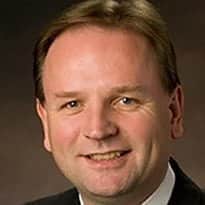Simon Stevens to head NHS England
- 24 October 2013

Simon Stevens, a one-time Blairite health advisor, has been announced as the new chief executive of NHS England.
Stevens, who advised health secretary Alan Milburn and then Prime Minister Tony Blair until 2004, when he left England to join US healthcare giant UnitedHealth, will take over from Sir David Nicholson on 1 April next year.
NHS England announced the appointment overnight. Chair Sir Malcolm Grant said Stevens was the man for the “exceptionally challenging leadership role” because of his “huge experience."
He said Stevens had a “commitment to the values of the NHS” and the “provision of high quality healthcare for all.”
Stevens also has some experience of NHS IT, since he was a government advisor when Labour was persuaded to launch the National Programme for IT in the NHS.
There is evidence that he helped to set up the crucial seminar at Downing Street that agreed the new "implementation strategy" for a "step change" in NHS information systems, and its initially tight timetable.
Stevens started his career as an NHS management trainee, but left management at a relatively early stage to become a special advisor to Frank Dobson, the first health secretary to be appointed by New Labour in 1997.
Stevens “co-authored” the 2000 NHS Plan, which was intended to effectively channel the big increase in funding that Blair announced for the health service into additional capacity to reduce waiting lists and improve quality.
However, while the plan secured considerable health service support, there was a perceptible change in the direction of NHS policy after Dobson left Richmond House to run for mayor of London.
His successor, Alan Milburn, put more emphasis on reviving commissioning and introducing competition to the provider side of the NHS.
Stevens was closely associated with the Milburn agenda, which is likely to raise concerns about the future direction of NHS England. Health secretary Jeremy Hunt has welcomed his appointment, saying he is a “reformer and an innovator.”
However, Unison has already condemned it. “Is this the Tory and Lib Dem government hoping to import American-style values into the NHS?” the union’s head of health, Christine McAnea asked on the Radio 4 Today programme this morning.
“There will be massive opposition if that is the case.” At UnitedHealth, Stevens rose to become executive vice-president of UnitedHealth Group and president of global health, with specific responsibility for healthcare reform.
NHS England’s statement said that he had been offered his new post on the same salary as Sir David: £211,000, but that he had taken a one year, voluntary pay reduction of 10% to reflect the spending pressures facing the NHS.
In 2008, Sir David laid out what has become known as the ‘Nicholson challenge’ for the NHS to find £20 billion of efficiency savings.
These are needed to bridge the gap between flat funding and the rising demand caused by an ageing population living with a growing burden of chronic disease – without raising waiting times or cutting quality.
Stevens will be expected to find radical ways for the NHS to deliver on the challenge, while also responding to scandals such as that at Mid Staffordshire NHS Foundation Trust.
In many ways, the situation may look similar to the one he and Dobson found when they first arrived in Whitehall, after a decade of under-investment in the NHS, and with the Bristol Royal Infirmary scandal about to break.
However, it is clear that the present government is not going to find the money that Blair found.
This will make the "reform" challenge considerably harder. The question facing Stevens and the NHS is which part of his healthcare experience he will bring to bear on it.




